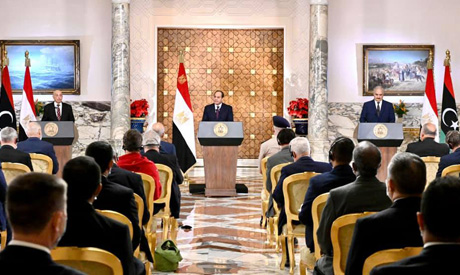
Al-Sisi (centre), Saleh (left), and commander of the Libyan National Army (LNA) Khalifa Haftar (right) during the press conference in Cairo on Saturday
Hours after a ceasefire initiative was announced in Cairo on 6 June, divisions emerged in the Government of National Accord (GNA), headed by Fayez Al-Sarraj, over how to respond.
One camp supports a halt to military operations in favour of a push towards hammering out a political resolution while a second camp seems intent on following Ankara’s rejection of the Cairo Declaration and continuing military operations in the hope of gaining control of Libya’s major oil producing areas in the so-called Oil Crescent. Which group will gain the upper hand is unclear, and likely to remain so at least until Al-Sarraj’s visit to Moscow is over.
Meanwhile, the US has hinted that it may become a military player in Libya. Washington is clearly rattled by the Russian presence in Libya, and is embarking on new security arrangements which involve the redeployment of US troops already stationed in Germany.
The United States Africa Command (AFRICOM), headquartered in Stuttgart, will be closely monitoring developments in Libya. AFRICOM is responsible for all US Department of Defense operations, exercises, and security cooperation on the African continent, its island nations, and surrounding waters, and has already announced its intention to deploy US troops in Tunisia for training — not combat — purposes.
The Russian Foreign Ministry has released a statement in support of the Cairo Declaration, and called on Libyan rivals to resume talks, saying on Monday that the Egyptian peace initiative should form the baseline for negotiations between Libya’s warring parties to decide the future of the country.
According to Egyptian and Libyan observers in Cairo, Moscow is keener than ever to contain the conflict in Libya. Russia not only wants to secure its existing economic interests in Libya, not least the $7 billion worth of contracts it signed with the Gaddafi regime, but is seeking a slice of the reconstruction pie. Currently, Moscow seems to be banking on securing a foothold in east Libya via its relationship with the Libyan National Army which controls most of Libya’s oil wells.
The Egyptian initiative is supported by France and Germany, both of which backed the recommendations on seeking a consensus among concerned states on resolving the Libyan crisis, that emerged at the Berlin International Conference on Libya.
The European Union and the UK also released statements supportive of the Egyptian initiative and calling for a political solution to the crisis.
According to the Foreign Ministry, Cairo is canvassing international powers and Libya’s neighbours on ways to military escalation in Libya involving foreign and domestic militias, while Turkey is pushing the militias to reject the ceasefire.
Libyan and Egyptian activists have posted videos on social media of military reinforcements being moved to Egypt’s border with Libya. The military has not made any statements on the moves though there is general agreement among analysts that in light of developments in Libya Egypt would be keen to reinforce security along the border.
Observers do not think there is a possibility of Cairo intervening militarily in its western neighbour. Cairo has repeatedly warned against military escalation, with President Abdel-Fattah Al-Sisi stating explicitly “Egypt rejects all forms of escalation that may complicate the crisis.”
The posted videos, though, have confused the calculations of the GNA and Ankara, according to a Libyan source in Tripoli.
A Libyan politician who supports the Cairo Declaration said that pressure to resume negotiations on a political solution to the crisis is important at the present time because though Turkey appears to have changed the balance of power in favour of GNA and Turkish militias, it does not automatically translate into a change in the political equation.
The source added there are signs the UN is pressing the rival parties to resume talks, and proposals made by Libya’s Parliamentary Speaker Aguila Saleh, included as part of the Cairo initiative, have gained the approval of several international powers.
The political path is clear at this point, and in light of the Berlin Conference it doesn’t require going back to square one, as the Cairo Declaration stressed.
*A version of this article appears in print in the 11 June, 2020 edition of Al-Ahram Weekly
Short link: